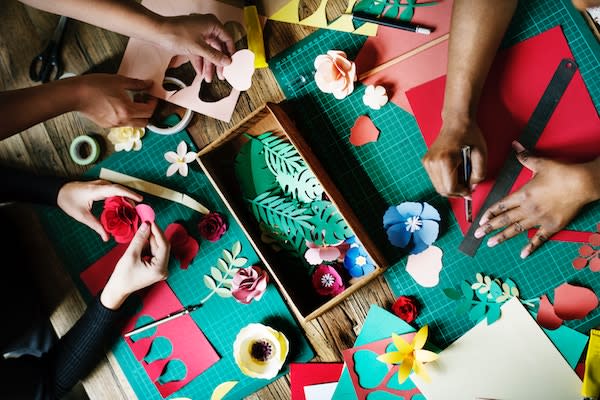People Must Learn the Same Lesson Again and Again Until They Change
We tend to think about gaining new skills like we think about winning the lottery:
"Gee, it'd sure be nice…"
"…Think of all I could do with those new skills and abilities!"
"…But the odds of achieving this are so small… mmm, gonna pass."
But while the lottery is a tax on people who are overly optimistic, you don't need luck, youth, or even a high IQ to gain that new skill you've been thinking about. All you need is a little elbow grease and the right learning techniques.
Whether you want to learn a new subject, gain a new skill, or just enhance the ones you already have, these 10 techniques will give you the framework you need to achieve mastery.
Need a little help staying on track with your professional development? Check out these four ways to use automation with Zapier to make sure you stick to your plan and achieve your goals.
1. Ditch Your Learning Style

Are you a visual learner? Or is your learning style kinesthetic or auditory? I'll tell you a secret: you're none of these.
As much as we'd like to believe that we learn better in a certain style, the truth is, these have little impact on our ability to learn.
In an intriguing talk at TEDxUWLaCrosse, Dr. Tesia Marshik shares a startling fact: 40 years of research on learning styles has found that matching teaching styles to learning styles makes no difference at all. In her own experiments, Dr. Marshik found that students learned the same way, regardless of the way material was presented to them.
Another study was a little more blunt in its judgments:
The contrast between the enormous popularity of the learning-styles approach within education and the lack of credible evidence for its utility is, in our opinion, striking and disturbing.
Yet the myth of learning styles persists, as a quick Google search will show you. So, what's really the best way to learn? It depends on what you're trying to learn in the first place.
For example, if you're trying to learn a new language, don't just read the textbook. Watch TV shows, listen to music, and converse with a native speaker through a language exchange app.
In an age where everything is available at the click of a button, there are many ways to learn. The key is to interact with the information. Using multiple sources will help you with this. Don't stick to books alone—gather relevant videos, podcasts, movies, and blogs as well!
2. Make It More Meaningful for Yourself
One main reason why "learning styles" don't work is that we learn things in terms of meaning. Finding meaning in our learning is the key.
Get productivity tips in your inbox
A 1973 study by Chase and Simon illustrates this well. In the first part of the test, amateur and expert chess players were shown a chessboard arrangement from a game in progress and asked to recall the position of the pieces. While amateurs players could barely recall any of positions, the experts were able to recall most of them. The experts see the strategy, the meaning behind why the pieces are where they are.
In the second part, experts and amateurs were shown boards with the chess pieces arranged at random and asked to recall them. Both groups performed about equally. This time, the experts couldn't find any real connection or meaning in the way the pieces are arranged.
The same goes for learning. We all learned various facts and figures in school but how many of those do we actually remember? Only the information that was meaningful to us, that we've been able to connect to our own life and experiences.
If you try to force yourself to just memorize random facts, you're likely to forget them. Remember all those times you tried to memorize formulae without understanding their relevance? In order to make your learning stick, it's important to make real life connections and see how it fits in the larger scheme of things.
The next time you take a finance class, instead of memorizing a formula, try to understand what relevance it has in practice and how you can use it to your advantage. You'll find you're able to grasp the concepts much more quickly.
3. Learn by Doing

Humans are natural learners—and we learn best when we perform the tasks we're trying to learn. No matter how good your grades were at college, most of your learning takes place once you enter the workplace and start applying what you've learned.
Let's say you're trying to learn SEO. Don't invest all your time in learning the jargon and theory—dive in as soon as you can to master the skill through trial and error. Start a blog. Write a few posts. Find out for yourself what works and what doesn't. The more you do it, the more you learn.
Better yet, build new habits to enforce your new skills. Start small and reward yourself to start building a pattern of behavior that will reinforce what you're learning.
4. Study the Greats, and Then Practice
Aspiring writers hear over and over that the best way to write better is to read a lot of books, especially the classics. Why? Because they'll learn a lot more by studying the writing styles of great writers, than they would by taking a course on writing.
Let's take this advice a step further. While studying the greats is essential, it is more of a passive exercise. In order to gain from it, you need to apply that learning to your own work as well.
One way to do this is to mimic experts until you eventually develop your own style and technique. Benjamin Franklin taught himself to write this way, as he shares in his autobiography:
I took some of the papers (from The Spectator magazine), and, making short hints of the sentiment in each sentence, laid them by a few days, and then, without looking at the book, try'd to compleat the papers again, by expressing each hinted sentiment at length, and as fully as it had been expressed before, in any suitable words that should come to hand.
On comparing his work with the originals, he found where he was lacking, and started turning the tales into poems and then back again. This is how he learned to express himself better.
This form of learning can be applied to any skill, be it writing, speaking another language, or even sports. Compare your work with that of experts in your field and you will notice areas that need improvement. Then, refer back to step 3 and keep practicing your skills. You will notice the difference.
5. Teach What You Learn
One of the more surprising ways you can learn a new skill is to teach it to someone else. Much research has been done on this phenomenon, but one study illustrates it particularly well.
In the study, two sets of participants study the same passage, with different expectations. One group was expected to teach it later, the other one expected a test on it. At the end, both groups were eventually tested on the material. Guess which group did better? Yep—the one that expected to teach it.
Why is this such an effective way to learn? Because when we learn with the intention to teach, we break the material down into simple, understandable chunks for ourselves. It also forces us to examine the topic more critically and thoroughly, helping us to understand it better.
You don't have to be an education major to use this trick. Try explaining what you're learning to friends or coworkers. If you're learning a new business software or skill, ask your boss if you can make a presentation to your team about it. See if you can field all their questions. Write regular blog posts or make vlogs while you're learning. See if you're able to express what you learn in simple words. The results might surprise you.
6. Spend More Time Practicing Things You Find Difficult

Practice in itself is great, but if you're practicing things you know well, you're doing it wrong. In order to excel at any skill, you need to push yourself out of your comfort zone and practice things you aren't good at. This is known as deliberate practice, and was popularized by Anders Ericsson.
Ericsson and his team studied expert athletes, violinists, and memory champions and found that they spent a lot of time improving areas they were weak. Additionally, they consulted their teachers to find out where exactly they were lacking.
Along with spending more time on your weaknesses, Ericsson also emphasizes the importance of concentration while practicing. If you're practicing while your mind is all over the place, you're not getting much out of it.
So the next time you sit to practice a new skill, step out of your comfort zone and challenge yourself. Concentrate on whatever is most difficult for you, and with time you'll find you achieve a higher level of overall efficiency.
7. Take Frequent Breaks
The brain has two modes—focused and diffused. For learning to happen, both modes are equally important.
While in focused mode, you're able to learn the nitty-gritties of a problem. In diffused mode, you're better able to see the big picture and bring it all together. You might have noticed this happening in the shower, when you're not focusing on anything in particular, then you suddenly remember a fact that was eluding you, or the solution to a problem.
It's important to let your brain relax for a while after a particularly intense session of study or practice, to give it time to connect the dots.
One good way to practice this is using the Pomodoro technique, which has you work on a project for 25 minutes, and then give yourself a 5 minute break. After four such sessions (that is, 100 minutes of work, with 15 minutes of break) you take another break for 15-30 minutes. This technique helps to keep your mind invigorated, and ensures you don't suffer mental fatigue.
Equally important is learning how to procrastinate productively, so your brain has time to truly recharge itself.
8. Test Yourself
We all loved to hate tests in school, but do you know just how effective they are in helping you learn? Turns out testing is one of the best ways to boost learning—even if you're simply practicing on your own, and not taking a high-stakes exam.
Testing even beats out methods such as re-reading and reviewing notes when it comes to making sure your learning sticks. An examination of the study techniques of top students by Elevate Education found that while most students re-read notes before exams, top students spend their time solving problems and taking practice exams.
Why is testing so effective? Because it takes recall a step further. Recall shows how much of the material you remember. Testing shows you how well you can use what you've learnt. After all, that is the ultimate goal of learning, isn't it?
9. Find A Mentor
Mentorship is perhaps the quickest way to take your skills to the next level. A mentor helps you navigate your field by offering invaluable perspective and experience.
Initially, look to friends, family, and coworkers for an expert in the skill you're trying to learn. If you come up with no one, start branching out your search to your larger community and industry.
When reaching out to experts, describe what you have to offer, rather than what you will gain. For example, maybe you could manage their social media accounts or help write their website content. Whatever services you can offer, be sure to let them know.
Business coach Michael Hyatt offers good advice about the ask:
Though a true mentor may be difficult to find, it's not impossible. If you have one in mind, start by building the relationship—just like you would anyone else. Don't lead with "Will you be my mentor?" (That's like asking someone to marry you on the first date.) Instead, get to know them. Look for opportunities to be generous. Start small and see where it goes.
The key is starting—the worst a person can do is say no, so ask!
10. Be Curious

Nothing stimulates learning quite like curiosity! So, as Ms. Frizzle from The Magic Schoolbus famously said: "Ask questions, make mistakes, and get messy!"
Instead of letting a textbook guide your learning, you take the lead. Seek answers from many sources. Don't merely memorize theories and techniques—question them at every step. Think about why they matter, why they're relevant. Tinker with the tools and knowledge available. See what you end up discovering! You may end up surprising even yourself.
Continue Learning with These Articles:
-
Still in college? Here are 20+ Productivity Apps for College Students and Young Professionals
-
Learn how to Take Back Your Day from Procrastination and find the pace of work and study that works best for you.
-
Protect your schedule and give yourself time for everything you want to do with these 3 Free Apps That Make Time-Blocking Easy
-
Stay on top of your professional development with these 4 strategies to make learning a priority
Reading image by Aaron Burden . Crafts image by Rawpixel . Piano practice image by Joao Silas . Lightbulb image by Riccardo Annandale . Library image by Priscilla Du Preez .
Get productivity tips delivered straight to your inbox
We'll email you 1-3 times per week—and never share your information.
Source: https://zapier.com/blog/learning-new-skills/